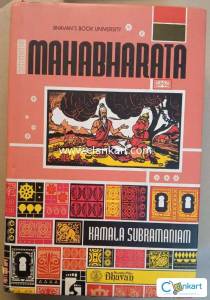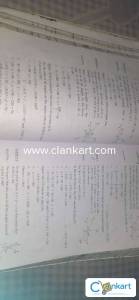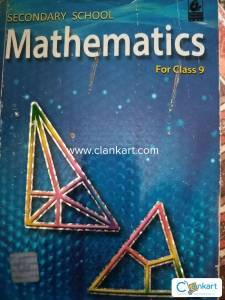Buy used Philosophy online in India
Buy Second Hand Books, Used Books Online In India
Mahabharata
Long ago, the Earth witnessed a catastrophic battle. It was a time when the Gods walked the world and mankind knew secrets they have long since forgotten. In such a time, there were two half-brothers named Pandu and Dhritarashtra. They were the heirs of the Kuru dynasty, the mighty kingdom fathered by the legendary Bharata, son of Shakuntala and Dushyanta. However, neither were fit to rule. Dhritarashtra was born blind, and Pandu had an illness which doomed him to die were he to ever engage in sexual intercourse. Dhritarashtra marries Gandhari, who bears him one hundred sons, the hundred Kauravas. Pandu marries Kunti, the adopted daughter of King Kuntibhoja, and Madri. Kunti s miraculous ability to summon Gods to grant her children yields Pandu five heirs, the Pandavas. Although the vast empire of Bharata had to be equally divided between the cousins, the Kauravas greed knew no end. Soon, this very greed engulfs both families in a battle that immortalized their names in legends and songs. Attributed to the Sage Veda Vyasa, the Mahabharata is one of the two great Epics of India, and this English translation retells the story for a new generation.
The secret by Rhonda Byrne
The worldwide bestselling phenomenon that has helped millions tap the power of the law that governs all our lives to create—intentionally and effortlessly—a joyful life.In 2006, a groundbreaking feature-length film revealed the great mystery of the universe—The Secret—and, later that year, Rhonda Byrne followed with a book that became a worldwide bestseller.Fragments of a Great Secret have been found in the oral traditions, in literature, in religions, and philosophies throughout the centuries. For the first time, all the pieces of The Secret come together in an incredible revelation that will be life-transforming for all who experience it.In this book, you’ll learn how to use The Secret in every aspect of your life—money, health, relationships, happiness, and in every interaction you have in the world. You’ll begin to understand the hidden, untapped power that’s within you, and this revelation can bring joy to every aspect of your life.The Secret contains wisdom from modern-day teachers—men and women who have used it to achieve health, wealth, and happiness. By applying the knowledge of The Secret, they bring to light compelling stories of eradicating disease, acquiring massive wealth, overcoming obstacles, and achieving what many would regard as impossible.
Manifest : 7 Steps to Living your best life
MANIFEST is the essential guide for anyone and everyone wanting to feel more empowered in their lives. Self-development coach and 'Queen of Manifesting' Roxie Nafousi will show you how in just seven simple steps you can understand the true art of manifestation and learn how to create the life you have always dreamed of.Whether you want to attract your soulmate, find the perfect job or your dream home, or simply discover more inner-peace and confidence, MANIFEST will teach you exactly how to get there in just 7 steps . . .1. Be clear in your vision2. Remove fear and doubt3. Align your behaviour4. Overcome tests from the universe5. Embrace gratitude without caveats6. Turn envy into inspiration7. Trust in the universeA meeting of science and wisdom, manifesting is a philosophy and a self-development practice to help you reach for your goals, cultivate self-love and live your best life.Unlock the magic for yourself and begin your journey to turning your dreams into reality.
IKIGAI : The Japanese Secret to a Long and Happy Life
Bring meaning and joy to all your days with the internationally bestselling guide to ikigai.According to the Japanese, everyone has an ikigai – a reason for living. And according to the residents of the Japanese island of Okinawa – the world’s longest-living people – finding it is the key to a happier and longer life.Inspiring and soothing, this book will bring you closer to these centenarians’ secrets: how they leave urgency behind; keep doing what they love for as long as possible; nurture friendships; live in the moment; participate in their communities and throw themselves into their passions. And it provides practical tools to help you discover your own personal ikigai. Because who doesn’t want to find the joy in every day?
How to read a book : The classic guide to intelligent reading
How to Read a Book, originally published in 1940, has become a rare phenomenon, a living classic. It is the best and most successful guide to reading comprehension for the general reader. And now it has been completely rewritten and updated. You are told about the various levels of reading and how to achieve them – from elementary reading, through systematic skimming and inspectional reading, to speed reading, you learn how to pigeonhole a book, X-ray it, extract the author's message, criticize. You are taught the different reading techniques for reading practical books, imaginative literature, plays, poetry, history, science and mathematics, philosophy and social science. Finally, the authors offer a recommended reading list and supply reading tests whereby you can measure your own progress in reading skills, comprehension and speed.This is a more recently published edition of ISBN 9780671212094. An earlier edition with the same ISBN can be found here.
Vedanta ; Voice of Freedom
Victory is Temporary the Battle is Eternal Vikramaditya and his Council of Nine have fought valiantly to repel the rampaging hordes from Devaloka and Patala – but Avanti has been brought to its knees. Ujjayini lies battered; its citizens are scared, and morale is badly shaken. Meanwhile, the barbaric Hunas and Sakas are gathering on the horizon, and cracks are emerging between the allied kingdoms of Sindhuvarta... The only silver lining is that the deadly Halahala is safe. For now. Bent on vengeance, Indra is already scheming to destroy Vikramaditya, while Shukracharya has a plan that can spell the doom for the Guardians of the Halahala. How long can the human army hold out against the ferocity and cunning of the devas and asuras? And will Vikramaditya’s love for his queen come in the way of his promise to Shiva? Doortodoor salesman, copywriter, business journalist and assistant editor at The Economic Times, SHATRUJEET NATH was all this before he took to writing fiction fulltime. He debuted with The Karachi Deception in 2013, followed by The Guardians of the Halahala and The Conspiracy at Meru, the first two books in the Vikramaditya series. At present, he is writing volume three of the series. Shatrujeet lives in Mumbai, but spends much of his time in the fantasy worlds of his stories. He can also be found at facebook.com/ShatrujeetNath and @shatrujeet.
Physics exemplar class 11
Plato is perhaps the most significant philosopher who has ever lived and The Republic, composed in Athens in about 375BC, is widely regarded as his most famous dialogue. Its discussion of the perfect city - and the perfect mind - laid the foundations for Western culture and, for over two thousand years, has been the cornerstone of Western philosophy. In this book, Simon Blackburn explains the judicial, moral and political ideas in the Republic and examines its influence on the modern world. He shows why, from St Augustine to twentieth-century philosophers such as Whitehead and Bergson, Western thought is still conditioned by this most important of books.
India's Ancient Past
R.S. Sharma, one of the best-known historians of early India, provides a comprehensive yet accessible text on the ancient period of Indian history. Beginning with topics such as historiography and the importance of Ancient Indian history, he goes on to cover the geographical, econological and linguistic settings, before looking at specific cultures of neolithic, chalcolithic types, the Harappan civilization, the Vedic period, the rise of Jainism and Buddhism, Magadha and the beginning of territorial states, the age of the Mauryas, Satavahanas, Guptas, and Harshavardhana. While taking the reader on this journey through time, he highlights important phenomena such as the beginning of urbanization and monarchy in India, invasions, the Varna system, commerce and trade, developments in philosophy and cultural efflorescence. He ends this insightful volume with a comments on the transition from the Ancient to the Medieval.This book also addresses a number of issues which have become current in discussion on Ancient Inida today, such as the Identity of the Aryan Culture, and Historical Construction. This is a volume meant for all those who want a masterly, lucid, yet eminently readable introduction to and overview on India's early history by one of the master-scholars of Indian history - be it students, tourists, or the interested lay reader
The concise law of human nature
The concise edition of the 2019 WINNER OF THE INTERNATIONAL BUSINESS BOOK AWARD From the million-copy bestselling author of The 48 Laws of Power Robert Greene is a master guide for millions of readers, distilling ancient wisdom and philosophy into essential texts for seekers of power, understanding and mastery. Now he turns to the most important subject of all - understanding people's drives and motivations, even when they are unconscious of them themselves. We are social animals. Our very lives depend on our relationships with people. Knowing why people do what they do is the most important tool we can possess, without which our other talents can only take us so far. Drawing from the ideas and examples of Pericles, Queen Elizabeth I, Martin Luther King Jr, and many others, Greene teaches us how to detach ourselves from our own emotions and master self-control, how to develop the empathy that leads to insight, how to look behind people's masks, and how to resist conformity to develop your singular sense of purpose. Whether at work, in relationships, or in shaping the world around you, The Concise Laws of Human Nature offers brilliant tactics for success, self-improvement, and self-defence.
























